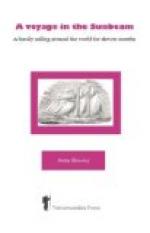There is nothing to see at Suez, but still we went for a ramble to see that nothing. We cleared our boxes and our letters, and then went on ankle deep in sand to the one European house, the railway station, the Arab quarter and the bazaars, where it is occasionally possible to pick up rather interesting little curiosities brought by the pilgrims from Mecca and Medina.
Thursday, April 26th.—Such a sunrise as this morning’s you could only see in Arabia or Egypt. There is a peculiarity about desert colouring at sunrise and sunset that can never be seen anywhere else. We had sundry visitors during the early morning, and before ten o’clock we were in the Canal and steaming on at regulation speed. As the sun rose the heat became intense, 96 deg. in the shade under double awnings. So far from there being a cool breeze to temper it, a hot wind blew from the desert, like the blast from a furnace. I stood on the bridge as long as I could bear the heat, to look at the strange desert view, which could be seen to great advantage in going through at the top of high water. Sand, sand everywhere; here a train of camels, there a few Arab tents, now a whole party shifting their place of abode; a group of women washing, or a drove of buffaloes in a small tributary stream. After going about eight miles we stopped at a gare (as the stopping-places are called) to allow three vessels to pass. One was a fine steamer belonging to the Ducal Line; the others were a Dutch and a German boat (one, the Friesland, has been since wrecked off Cape Finisterre, in December 1877). The cleanliness and general smartness of the former presented a great contrast to her companions, on which the passengers looked very hot and uncomfortable. The centre part of each vessel was crowded with a large number of Dutch or German boys, going out as soldiers to Acheen, who certainly did not appear to be enjoying their voyage.
We passed Chaloux and reached Ismailia just at nine o’clock, not without considerable effort on the part of the pilot. A steam launch came off from the shore, and we (children and all) landed at once; and, after a moonlight donkey ride, dined at the excellent Hotel de Paris, kept by an old Frenchman. Table-d’hote was over, but they gave us a capital little dinner by ourselves. The children and I, and some of the gentlemen, start to-morrow, overland via Cairo, to join the yacht at Alexandria, in order that they may see the Pyramids. It was a glorious night as we rowed off to the yacht under the bright beams of the full moon, and the air, too, was quite fresh and cool—a most refreshing change from the noontide heat.




